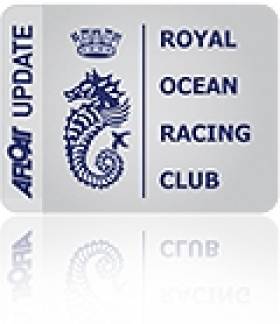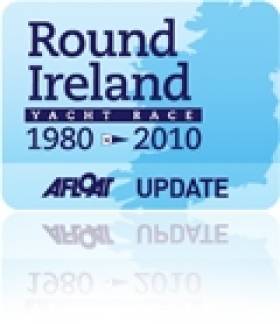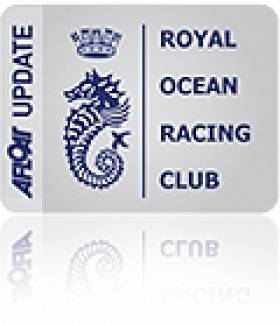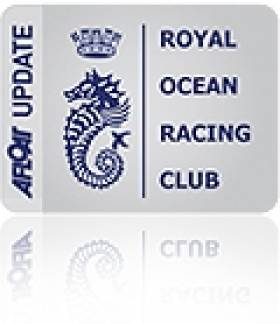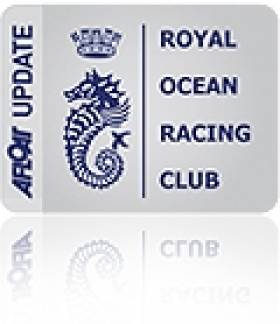Displaying items by tag: RORC
Comm Cuppers Round Island, not Ireland
Two of the three boats in Ireland's Commodore's Cup team are booked in for the annual Round the Island race in the Solent on June 19. The race, which already boasts 1,200 entries, kicks off the day before the Round Ireland, which is struggling to make the 20-entry mark at present.
Anthony O'Leary's Antix and the new Crosshaven-based Corby, Roxy 6 appear in the 399-boat IRC lineup.
Racing 50 miles around the Isle of Wight will no doubt be beneficial for the teams aboard both boats ahead of August's Commodore's Cup, and six Irish boats feature in the IRC section. However, the clash calls into question the timing of the Round Ireland. With the Round the Island, the single most popular sailing event in the British Isles every year, taking place on the solstice weekend, the Round Ireland puts itself at a serious disadvantage in seeking entries at that time.
The chance of tempting boats up from the Solent is lessened, when skippers are faced with a shorter, cheaper and more sociable event at home. And with the Solent a similar distance from Cork, It's no surprise that two of the top boats in Ireland, both based in Cork, have decided to use it as a training event for the Commodore's Cup.
Insiders have already grumbled that this point is one Wicklow needs to address going into the next Round Ireland cycle.
Share your thoughts on Afloat.ie's forum.
Round Ireland Race Secures Sponsor
Wicklow Sailing Club has secured a title sponsor for its 30th anniversary Round Ireland race next month.The 2010 race sets sail under the banner of Conway Media as title sponsor on June 20th, according to race organiser Dennis Noonan. The deal was signed last week between the Club and local businessman and sailor Roy Conway. Entries to date for the race number 13 but Noonan remains confident the final fleet will total 40 or more.
More on the Round Ireland Yacht Race:
Round Ireland Yacht Race 2010 Review
Round Ireland Yacht Race, Ireland's top offshore fixture
A Round up of 80 stories on the 2010 Round Ireland Yacht RaceRating Cost of Composite Rigging to be Reduced in 2011
The rating cost of composite standing rigging will be reduced with effect from 1st January 2011 following a recent meeting of the IRC Technical Committee.
The Committee noted that the technology of composite standing rigging has matured significantly in recent years to the extent that it is now becoming close to mainstream.
There is now evidence that composite standing rigging has a life expectancy at least that of steel rod rigging.
In parallel, the cost of composite standing rigging has fallen to the extent that some brands are now available at costs only a little higher than the equivalent steel rod rigging.
Composite standing rigging is also now beginning to become available as a standard option from production boat builders.
Noting all of the above, the Committee has concluded that the rating cost of composite standing rigging will be reduced with effect from 1st January 2011 (1st June 2011 in IRC southern hemisphere countries). This notice has been issued now to enable owners considering either new boats or modifications to their existing boats to plan accordingly.
The exact effects on TCC are not yet available. The Committee’s intention however is that the effects should in future be broadly neutral in terms of speed versus rating. The effect of composite standing rigging will also continue to vary from boat to boat
Apollo's Strengths Revealed in RORC's DeGuingand Bowl
Nigel Passmore’s turboed TP52, Apollo had a cracking De Guingand Bowl winning overall and IRC Super Zero, in some style but it didn’t start off very well as Nigel Passmore explains;
“We did have the worse possible start to the race, we were half a boat length over and whilst the rest of the fleet enjoyed a spinnaker run, we were putting up a headsail and making our way back to restart the race, it took us five painful minutes.”
By the time Apollo had reached St.Catherine’s Point, they had caught up the entire fleet and crossed ahead of rival TP52, John Merricks II.
The De Guingand Bowl Race is part of the RORC Season’s Points Championship. It is a testing series of 12 races and for the serious offshore sailor, trying to win the Season's Points Championship is a real challenge. The longest race this year is the non-stop, 1760 mile, Sevenstar Round Britain & Ireland Race that is both tactically and physically challenging.
“I don’t think I have ever raced 140 miles down the south coast of England without ever encountering a foul tide “ admitted Nigel Passmore. “But one of the greatest strengths of Apollo is the resolve of the crew, they always give 100%, all of the time and we dug ourselves out of a hole and we are delighted with our win.”
“We decided to come up from Plymouth to compete in the RORC season because we wanted to race the best and the fleet for the De Guingand Bowl had many great boats which are very well sailed. We are looking forward to the Myth of Malham, on the May Bank Holiday. But this afternoon we will all meet up and have a bit of a celebration” concluded Nigel Passmore.
In IRC Zero, Peter Rutter’s Grand Soleil 43, Quokka 8 had a marvelous debut race, winning the class by some distance in some good company, Jens Kuehne’s American RP48, Sjambok was second and South African, Michael Bartholomew’s King 40, Tokoloshe was third on corrected time. Quokka 8 was also runner up overall.
IRC One was won by Neil Kipling’s J 122, Joopster. “It is Neil’s first season with the boat and he is a very happy owner which is always a good thing” commented navigator Tristan Nelson. “We will be racing most of the RORC races this season including the IRC Nationals next month but our long term goal is the 2011 Rolex Fastnet Race.”
Second in IRC One was RORC Commodore, Andrew McIrvine and Peter Morton’s First 40, La Response with Paul Turner’s Grand Soleil 43, Artemis in third.
Past RORC Commodore, David Aisher was racing his J 109, Yeoman of Wight and had a successful race, winning IRC Two in an extremely competitive class which including several other Rolex Commodores’ Cup contenders. David’s crew has several members of the British Keelboat Academy and they showed great resolve by anchoring off Anvil Point at a crucial part of the race. Tired but elated, David was highly complimentary of his crew and delighted with the class win.
Steve Northmore’s A 35, Waterjet.co.uk was second with Chris and Hanna Neve’s First 35, No Chance in third place.
In the two handed division John Loden’s HOD 35, Psipsina was victorious beating Kirsteen Donaldson’s X 332, Pyxis into second place with Peter Olden’s A 35, Solan Goose of Hamble into third.
In IRC Three, Kirsteen Donaldson’s X 332 Pyxis won a grueling race, crossing the finish line after nearly 28 hours of racing. Second was Trevor Nicholls’ Starlight 39, Spellbinder of Wytch.
The next race as part of the RORC Season’s Points Championship will be the Myth of Malham. The 230 mile Round Eddystone race starts on Friday 28th May.
Royal Cork's Jamie McWilliam Heads up Team Hong Kong
Having finished fifth overall in 2008, surprising many of the more seasoned campaigners in the process, McWilliam and his teammates were resolute in their determination to return.
With three months to go to the 10th edition of the biennial Rolex Commodores' Cup, the international fleet has every prospect of being one of the more exotic in recent events. A noteworthy success in these straightened times.
The Hong Kong team is made up of Rockall III, a Corby 36 owned by Chris Opielok, in the small boat slot. 'Opie', as he is known, is a Hong Kong sailing legend, having won two Admiral's Cups for his native Germany. Rockall III is the former Rosie, which has a dominant history in UK & Irish IRC racing. The middle boat is Blondie IV, a Mills (King) 40 chartered by Anthony Day from Helmuth Hennig, both very well known Hong Kong racers. Blondie was 2nd in class in Rolex Commodores' Cup 2008 and has an exceptional track record under her former owner. The big boat is Mandrake, Nick Burns' Mills 40.5, formerly Ngoni and Tiamat. AsTiamat, she had an outstanding Rolex Commodores' Cup in 2006.
The headline foreign contingent is perhaps South Africa, participating at the regatta for the first time. Hong Kong has confirmed it will be back following its happy venture in 2008. Thereafter, the northern European teams – Ireland, France and the United Kingdom - that are the traditional backbone of the event - will be present in numbers. Organisers, the Royal Ocean Racing Club, anticipate a total of 12 teams. Racing is from 15 to 21 August, with close of entry on 12 July.
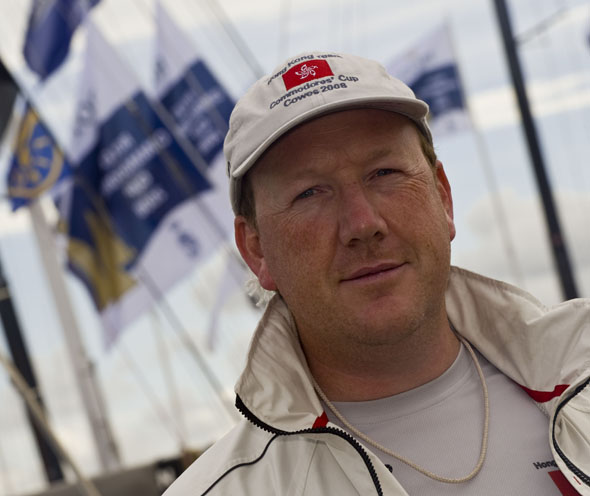
McWilliam (pictured above) is not just to participate, mind you, but to have a crack at winning. "In 2008 we arrived with a crew that had trained hard but which had never seen the boats before the regatta, as they were either charters or brand new. This meant that we spent quite a bit of important time just before the event working on the boats instead of working on our speed, and as a result we were still learning about the boats during the series. Our team this time was determined to avoid that mistake," comments McWilliam, explaining that this time, "all the boats are owned by Hong Kong owners and we therefore have much more time [to prepare]. Our full team will be at the UK IRC Nationals in late June and we are scheduling other weekends over the summer for the boats to have new sail trials."
It is a tall order to travel almost halfway around the world to participate in a three-boat team event. The three yachts needed to compete range in size, roughly, between 35 and 45 feet. There are crews to be identified, accommodation and travel to be arranged. McWilliam is clear that it is worth the effort, "it's always exciting going to an event where you think you have a chance to win but where you know you're going to have to really perform to achieve that. It provides a great combination of expectation, anticipation, and nerves. Combined with the knowledge that we are representing the small sailing community in Hong Kong, it's a really exciting deal."
McWilliam acknowledges the difficulties involved for foreign teams, particularly getting the right boats in the right condition to the venue when they are located more than a delivery trip away. He clearly believes more countries should look more seriously at the possibilities, "I would definitely encourage other teams to participate. The Solent puts unique and intense pressure on crews and seemingly trivial moments turn out to be really critical, like a down tide bottom mark rounding where you've got to be perfect in order to hold your lane to get out of the current. I also believe that the best team here has always won the event, and that's the best recommendation I know for a regatta."
The Hong Kong team is looking forward to renewing rivalries with some of the teams it competed against in 2008. They are not here to make up the numbers, "we really enjoyed the event in 2008 and feel that the event is a good match for the type of sailing we do in Hong Kong, and therefore represents a great opportunity for Hong Kong to compete against peers and find out where we rank. We were happy with our 5th position in 2008 but saw it very much as an initial effort and unfinished business."
The Rolex Commodores' Cup is a weeklong series mixing inshore racing on the waters in and around The Solent, the body of water separating the Isle of Wight from the mainland United Kingdom, with an offshore course that takes the fleet out into The English Channel and a course round the Isle of Wight. All of the racing is typified by one thing. Comprehensive knowledge of the tides and currents affecting these areas is essential. Furthermore, it has been proved time and again that is not just the team with the best boats or the best sailors that wins. It the team that is the best prepared in all aspects.
The Rolex Commodores' Cup will be held off Cowes, Isle of Wight, from 15 to 21 August. Entries, which must be made by Member National Authorities, close on Monday 12 July.
A big variation in wind strength and direction gave the competitors in the RORC Cervantes Trophy Race plenty to think about; spotting the changes in the conditions and reacting to them proved crucial. Sailing Logic’s Reflex 38, Visit Malta Puma, (that will compete in June's Round Ireland race) carried on from their highly successful 2009 season winning the coveted Cervantes Trophy over the Bank Holiday weekend. A glorious spinnaker start saw the fleet out of the Solent but light airs beset the fleet mid-Channel before filling in to give the fleet a beat to the finish at Le Havre.
“We are really delighted with our win and it was down to a very good effort by all of the team,” said skipper Philippe Falle. “The decisive stage of the race was rounding the A5 buoy. The wind had gone super light and forward, it was difficult to keep the boat going but by looking at the gusts on the water under the moonlight we kept her moving. The crew really concentrated on trim, helming and weight distribution and we knew that if we could match wind speed to boat speed we would be doing well. Sometimes the wind speed was as little as three knots but we kept going. We finished last season with a win into Cherbourg, so it was nice to win two on the trot.”
In IRC Super Zero Nigel Passmore’s Apollo won the battle of the TP52s, beating the British Keelboat Academy’s John Merricks II on the water and on handicap. Andrew Dawson’s Class 40, Spliff, was third picking up the Class 40 division win.
IRC Zero saw another win from Mike Greville’s Ker 39, Erivale III, repeating their class win from last year. “We got a pretty good start but a broach near Owers put us in the pack with smaller boats,” commented Mike Greville. “We had a fetch out into the Channel and the only real decision was whether to sail with the Jib Top or the Genoa. However, the breeze eventually started to go forward and light. This turned the race into a much more tactical one. Our strategy was to tack on the shifts, spotting them is not easy in light airs and concentration is paramount.” John Stapleton’s First 44.7, Vespucci's Black Sheep, made a welcome return to offshore racing taking second place in class with the X 41, Pharo, in third.
In IRC One Visit Malta Puma was first but this was a very competitive class with the top four boats within 20 minutes of each other on corrected time. Steve Anderson’s First 40.7, Encore, was second in class and overall by less than two minutes. Christopher Opielok’s Corby 36, Rockall III, was third and RORC Commodore, Andrew McIrvine sailing with Peter Morton on their brand new First 40, La Réponse, were fourth. Both Rockall III and La Réponse will be hoping to race in this year’s Rolex Commodores’ Cup.
Noel Racine in a new JPK 10.10, Foggy Dew, was the winner of IRC Two. “I only picked up the new boat from L’Orient last week, so we have a lot to learn but it is a great start. We will be competing in most of the RORC races this season and we have a clear plan going through to next year, in preparation for the 2011 Rolex Fastnet Race,” commented Le Havre resident, Noel Racine. David Aisher’s J 109, Yeoman of Wight, was second with Mike Moxley’s HOD 35, Malice, in third.
David Lees’ High Tension 36, Hephzibah, won IRC Three in the RORC Season’s Points Championship in 2009 and the Lymington based boat kicked off the 2010 season in fine style, winning in class. Alan Thornewill’s MG 346, Spirit of Daedalus, was second and Kirsteen Donaldson’s X 332, Pyxis, was third.
The Two Handed Division saw ten entries. Mike Moxley’s HOD 35 consolidated their podium finish in IRC Two by taking the prize for the best two handed boat on corrected time. James Gair’s First 40.7, Below Zero, was second and Peter Olden’s A35, Solan Goose of Hamble, was third.
There are two RORC races over the next weekend of offshore racing: The 180 mile North Sea Race from Harwich to Scheveningen starts on Friday 14th May and the De Guingand Bowl Race in the Channel starts on Saturday 15th May.


























